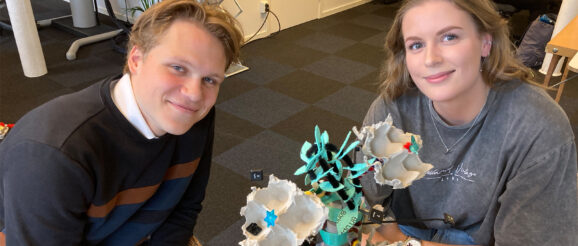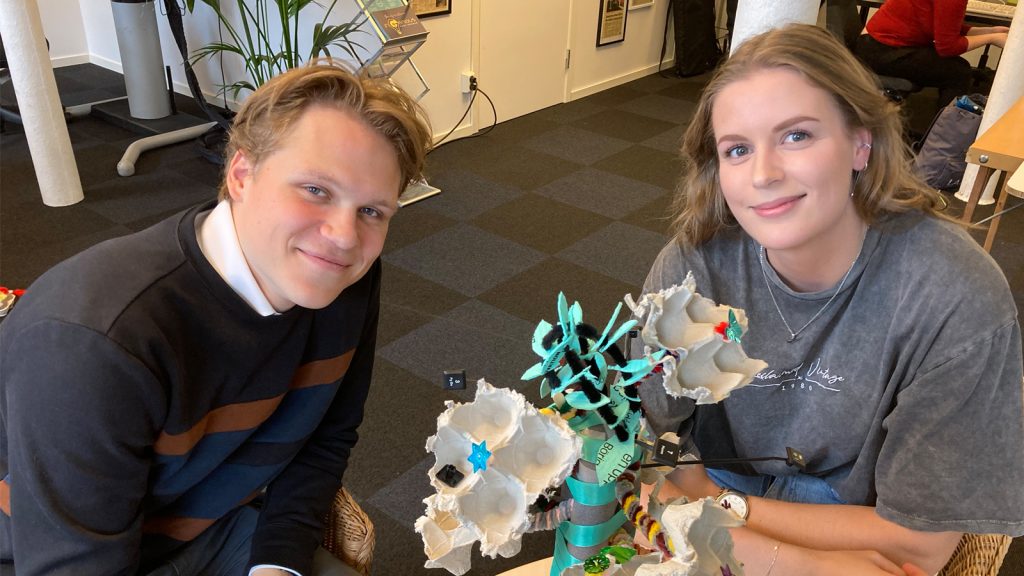Psychosocial Security in Focus as Students Present New Innovation Concept


Being a
human rights defender often means that you go to work despite knowing that you
will face threats and harassment. Even on days when this does not happen, the
stress of knowing that it could takes its toll. The problem of burnout and
stress among human rights defenders became the starting point for five students
from Linköping University, Sweden, when tasked with the challenge to innovate
for human rights.
Civil Rights Defenders and Linköping University began collaborating in 2018 under the Vinnova funded initiative Right Agenda Accelerator. Our aim has been to equip future innovators with a human rights perspective that helps them develop sustainable solutions to pressing challenges. A key factor has been to bring our respective expertise to the table, in order to develop an innovation process that considers both the direct and indirect effects on human rights in the early stages of idea development.
In 2020, we had the opportunity to partner with inGenious – an international development platform where organisations, companies, and public bodies bring forward real-life challenges in need of solutions. Five students from Linköping University were presented with a challenge brought forward by Civil Rights Defenders: to come up with an innovation concept aimed at strengthening the efficiency and security of human rights defenders.
“This was a
chance to move away from theoretical aspects of studying and be faced with a
real-life problem. I applied to this course because I found it really
interesting to see how technology and human rights could be connected,” said
Wilhelm Hansson, one of the students who took part in the project.
Coming up with “Mindmate”
The five
students come from academic areas ranging from economics and service management
to industrial engineering and computer science. Working in diverse groups, each
student contributes with their respective skills and experiences.
“I think
that when you combine the perspectives from people with different backgrounds,
you can increase the ability to come up with good solutions. This is one of the
reasons for why I wanted to be part of this course. I also wanted to get an
opportunity to connect with the work of Civil Rights Defenders and see how I
could be a part of that,” said Gustaf Söderholm.
When deciding on a focus area for their innovation concept, the students, Wilhelm Hansson, Carl Rosander, Alice Omolola, Gustaf Söderholm, and Karin Göransson, started off by looking at the challenge individually and then discussed their findings in the group.
“Based on
all the material we were reading, we saw that there were a lot of problems that
needed fixing. It was a matter of choosing one where we could make an impact.
At the end of the day, we made a decision that felt right, and we have not
regretted it”, said Alice Omolola.
Human rights defenders who constantly risk their lives for others do not only risk physical harm. Knowing that you may be subjected to violence, smear campaigns, or that your family members are in danger can lead to a severe stress level. Being under constant surveillance or frequently interrogated by security services can add yet another layer of pressure. Due to stigmatisation and a lack of awareness in society, many are left to deal with the stress on their own, which often results in breakdowns or burnout. Therefore, looking deeper into the psychosocial wellbeing of human rights defenders became a key focus for the five students.
“There is a view that human rights defenders should always be able to be effective and that they should never fall down. At the same time, there is a large stigma around psychosocial illness. We wanted to come up with a solution to mitigate risks to their wellbeing before they became reality. That is how we came up with Mindmate,” said Wilhelm Hansson.
The idea behind Mindmate is to create a verified process for psychosocial analysis by self-assessment. Based on the evaluation of this assessment, the human rights defender receives a report and recommendations on clear and concise steps to either take preventive actions or to seek further help. This would be available for human rights defenders through a mobile application where educational material, such as reading material, training videos, and exercises, is available in an easy-to-digest way.
“Mindmate should be seen as one of several tools, as well as a first-aid kit, in the defenders’ toolboxes. It will also work as prevention. Human rights defenders can for example take part in longer training programmes that would help them and make them more prepared in the various situations that they face,” said Carl Rosander.
The group
of students is well aware that many human rights defenders need to be able to
stay anonymous and they have worked actively with a solution that can ensure
that user privacy remains a priority.
“A big part
of it, which we frequently discussed, is user privacy. It is embedded in the
solution. And this is very crucial to the human rights defenders,” said Carl Rosander.
Why a human rights perspective is needed in the innovation process
Civil
Rights Defenders partners with human rights defenders that work in some of the
most difficult and dangerous areas in the world. One of our key aims is to
increase their security so that they can continue their imperative work. Whether
repressive regimes come up with new ways of targeting our partners or if they use
old methods, innovative counter-strategies make a crucial difference. That is
why collaborations such as the one with Linköping University can be so
important.
“The
lack of psychosocial security is very common among human rights defenders. Many
of our partners are constantly being targeted in unpredictable ways and the
need for preventive measures is pressing. The students this year have
incorporated the much-needed human rights perspective into the innovation
process and come up with an idea that could help our partners,” said Zinaida
Muradova, Protection Officer at Civil Rights Defenders.
“It is
difficult to innovate in a field that you are exposed to all the time. You see
and live these issues, but you might not be innovators. If you give the floor
to someone who is not exposed to the issue all the time, that person gets the
chance to explore the problem from other angles and come up with solutions
based on what they see. We really worked in this way in this project and that
is something that I will bring with me in future innovation processes,” said Wilhelm
Hansson.
Moving forward
Having verified
the problem and outlined a potential solution, the next step for the students
will be to investigate how to move forward. This includes involving experts
within the fields of psychology and psychosocial science for further insights. In
order to continue the process of making Mindmate available to human rights
defenders globally, the group of students is currently receiving additional
support for innovation from advisors at Linköping University.
“It is
quite rare to get an opportunity to develop your ideas and concepts further
even though the course has come to an end. I believe that I speak for all of us
when I say that we are very excited to continue working on this project.
Regardless of where we eventually end up, I am sure that I will learn a lot on
the way there,” said Karin Göransson.
Over the
coming months, the concept will be developed further. One of the ambitions is
to investigate if it can be broadened and potentially serve demands from a
wider audience than defined initially.
”Basing idea development on urgent needs of a
specific group gives potential to challenge norms and provide value outside of
that focus area. This student initiative shows innovative potential far beyond
the domain of human rights action and may help identify psychological distress
in situations for a far wider community in society,” said Karin Ackerholm,
Innovation Adviser, Linköping University.
The post Psychosocial Security in Focus as Students Present New Innovation Concept appeared first on Civil Rights Defenders.
